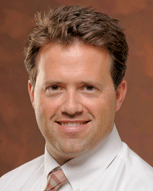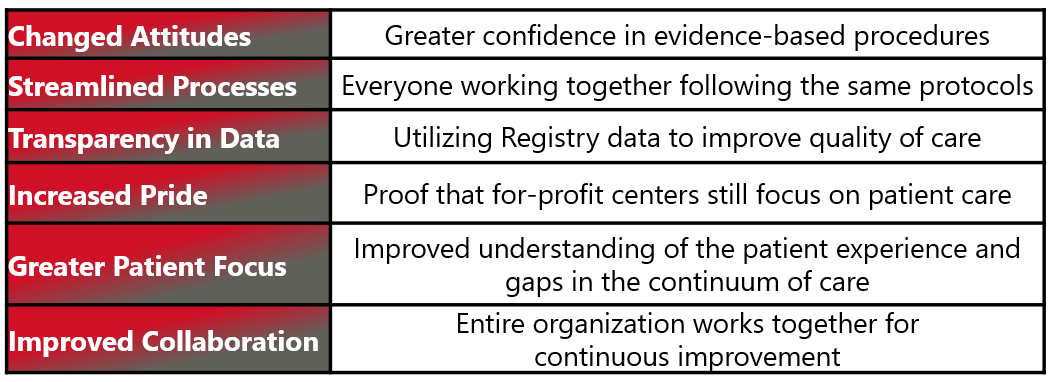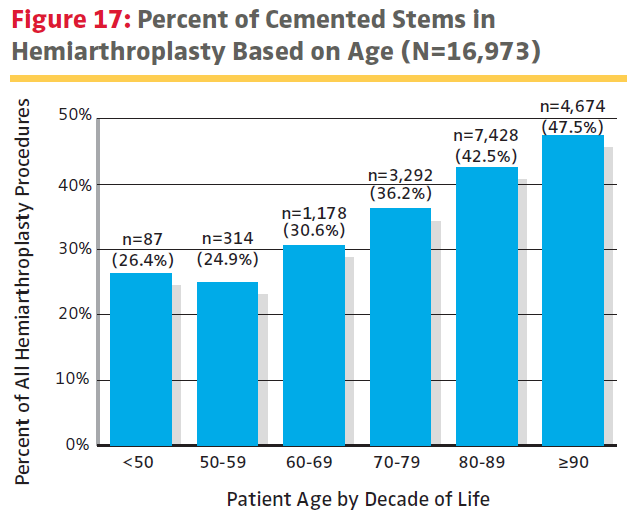Presidio Surgery Center Earns Joint Commission Advanced Certification for Total Hip and Total Knee Replacement


The American Joint Replacement Registry (AJRR), part of the American Academy of Orthopaedic Surgeons (AAOS) Registry Program, is the largest hip and knee registry in the world based on annual procedures submitted. With total joint procedures increasingly migrating to the outpatient space, collecting ambulatory surgery center (ASC) procedure data, via registries like AJRR, informs outpatient practice. The data helps demonstrate that ASCs are viable sites for orthopaedic surgical services. Presidio Surgery Center in San Francisco, a California Pacific Medical Center affiliate, discovered the benefits of AJRR participation early. They submitted their first procedures to the Registry in 2015 and by March 2019, the number of hip and knee arthroplasty procedures had grown to 366.
Presidio Registry Participation Supports Joint Commission Certification
 While Presidio’s initial Registry data collection helped with the analysis of their quality performance, additional continuous quality improvement initiatives were supported by The Joint Commission. Already accredited by The Joint Commission, Presidio received their Advanced Total Hip and Total Knee Replacement Certification in 2016, and was re-certified in 2018. Rob Mayle, MD, Medical Director of the Joint Replacement Program at Presidio Surgery Center, said, “Presidio Surgery Center has been able to demonstrate high-quality performance through registry participation, Joint Commission best practices, and patient-reported outcomes. Our evidence-based approach to patient care is valued by our clinical team, contracting entities, and patients. We chose AJRR as our registry because of the flexibility of the RegistryInsights® platform and the size of the database allowing for meaningful benchmark analysis.”
While Presidio’s initial Registry data collection helped with the analysis of their quality performance, additional continuous quality improvement initiatives were supported by The Joint Commission. Already accredited by The Joint Commission, Presidio received their Advanced Total Hip and Total Knee Replacement Certification in 2016, and was re-certified in 2018. Rob Mayle, MD, Medical Director of the Joint Replacement Program at Presidio Surgery Center, said, “Presidio Surgery Center has been able to demonstrate high-quality performance through registry participation, Joint Commission best practices, and patient-reported outcomes. Our evidence-based approach to patient care is valued by our clinical team, contracting entities, and patients. We chose AJRR as our registry because of the flexibility of the RegistryInsights® platform and the size of the database allowing for meaningful benchmark analysis.”

A Conversation with Jessie Scott, Presidio Surgery Center Administrator
Jessie Scott talks about their site’s Registry and Advanced Certification journey. Portions of the Q & A that follow are excerpted from The Joint Commission’s “Spotlight on Success” series.
Presidio Surgery Center was the first ASC in California (and the second in the country) to achieve Advanced Total Hip and Total Knee Certification from The Joint Commission.
“Becoming the first Advanced Total Hip and Total Knee Certified ASC in California helped combat any lingering misconceptions about ASCs and their focus on delivering high-quality patient care,” said Jessie Scott. “Working with The Joint Commission also helped standardize our practices, streamline our processes, and got the entire staff working on the same team toward the same goal,” she added.
Q: Why did you choose to seek total hip and total knee certification?
A: Accreditation and certification by The Joint Commission prove that we at Presidio are serious about providing the best patient care and integrating our services into the patient's continuum of care. I think it surprised a lot of hospitals in the area that we were certified - and they weren't. The standards provided us with a road map to an evidence-based high-quality program.
Q: What role did AJRR play in your certification results?
A: Presidio's key certification results, summarized in the conclusion of this blog, all benefited from our Registry participation. Most significantly, our improved analytical capabilities, utilizing the AAOS RegistryInsights platform, changed attitudes and gave us greater confidence in evidence-based procedures. Our patient-reported outcomes (PRO) program, also enabled by RegistryInsights, gave us greater patient focus. It improved our understanding of the patient experience and gaps in the continuum of care. Effective July 1, 2019, AJRR was selected as The Joint Commission's sole registry pathway supporting Advanced Total Hip and Total Knee Certification.
Q: Why did you decide to work with The Joint Commission?
A: We wanted to hold ourselves to the same standards as hospitals do. Also, Presidio was already accredited by The Joint Commission, so it was a natural progression that we would come back for our advanced certification. When I first took over the surgical center, it was on the verge of being closed. The Joint Commission came in a few months later and the surveyor showed me how to use the standards as a road map to achieve accreditation and ultimately, to run a safer, more efficient business. When this new advanced certification came out, I knew that by following the same thought process and approach we could achieve it as well.
Q: What were your impressions of the certification review process?
A: Going through the review process helped make our hip and knee arthroplasty program better, and brought it to a higher level. We used the standards manual as a road map to achieve our goals. We were able to make changes to the program that allow strong communication across the continuum of care, while enhancing the overall safety of our center.
We've also benefited from some of the new internal processes that The Joint Commission recommended, for example conducting a monthly meeting. I was skeptical that ongoing monthly meetings would be well attended, however, everyone here is so invested in being part of a team now that they use this forum to proactively bring up concerns and issues. We can then work together and resolve them more quickly. Everyone has a voice: doctors learn to see things from the nurses' viewpoint and vice versa.
Q: Has your organization made changes as a result of the review?
A: Yes. I think many of the changes were reflected in our attitudes as much as processes. The program focuses so much on being evidence-based that it's changed the way people think. Rather than basing our practices only on personal experiences or training, we now hold all our activities to evidence-based practices and national standards. I now hear doctors discussing what evidence there is for certain procedures they may be considering. Also, having a standard protocol means that everyone is on the same page; nurses don't have to remember to do things differently for each individual surgeon. As a result, the entire process becomes more streamlined, efficient, and safe.
Q: What edge does certification offer your organization?
A: Advanced Certification has helped new physicians feel confident in our program. Being certified as a place of excellence is also important to our patients, and helps make choosing us a more confident choice. I would definitely recommend the process to other ASCs. I'd also stress the importance of partnering with the right registry, in this case AJRR, to ensure a critical mass of data for comparative purposes like benchmarking. It helps to get that outside perspective for improvement areas and it keeps us on our toes. The last thing we ever want to be is complacent.
Q: How would you summarize your Registry-driven practice changes?
A: AJRR participation empowers us to enhance our patient experience and benchmark performance; empowers our surgeons to reduce complications and revision rates; and supports a culture of evidence-based medicine.
Q: How would you summarize your certification results?
A: Certification has helped us standardize our joint program using evidence-based practices. In the end, it made it easier for us to take better care of our patients.
Our Key Certification Results

For more information on joining the AJRR and the AAOS Registry Program, visit www.aaos.org/registries. Contact the AAOS Registry Program by calling 847-292-0530 or email RegistryEngagement@aaos.org.
For more information on Joint Commission Ambulatory Care Accreditation and Certification, please contact The Joint Commission at 630-792-5286 or AHCquality@jointcommission.org.
Be sure to leave a comment in the form below!



